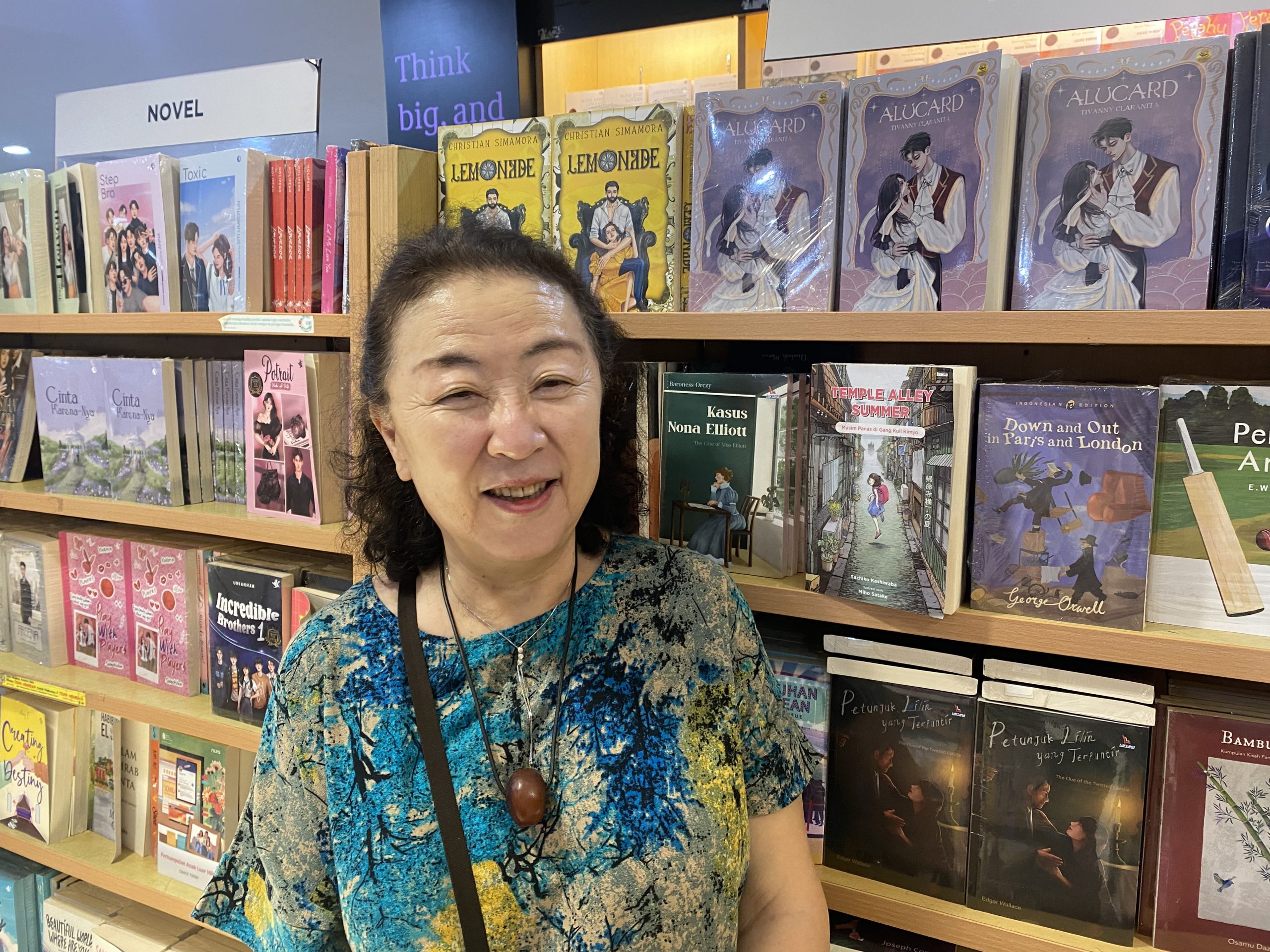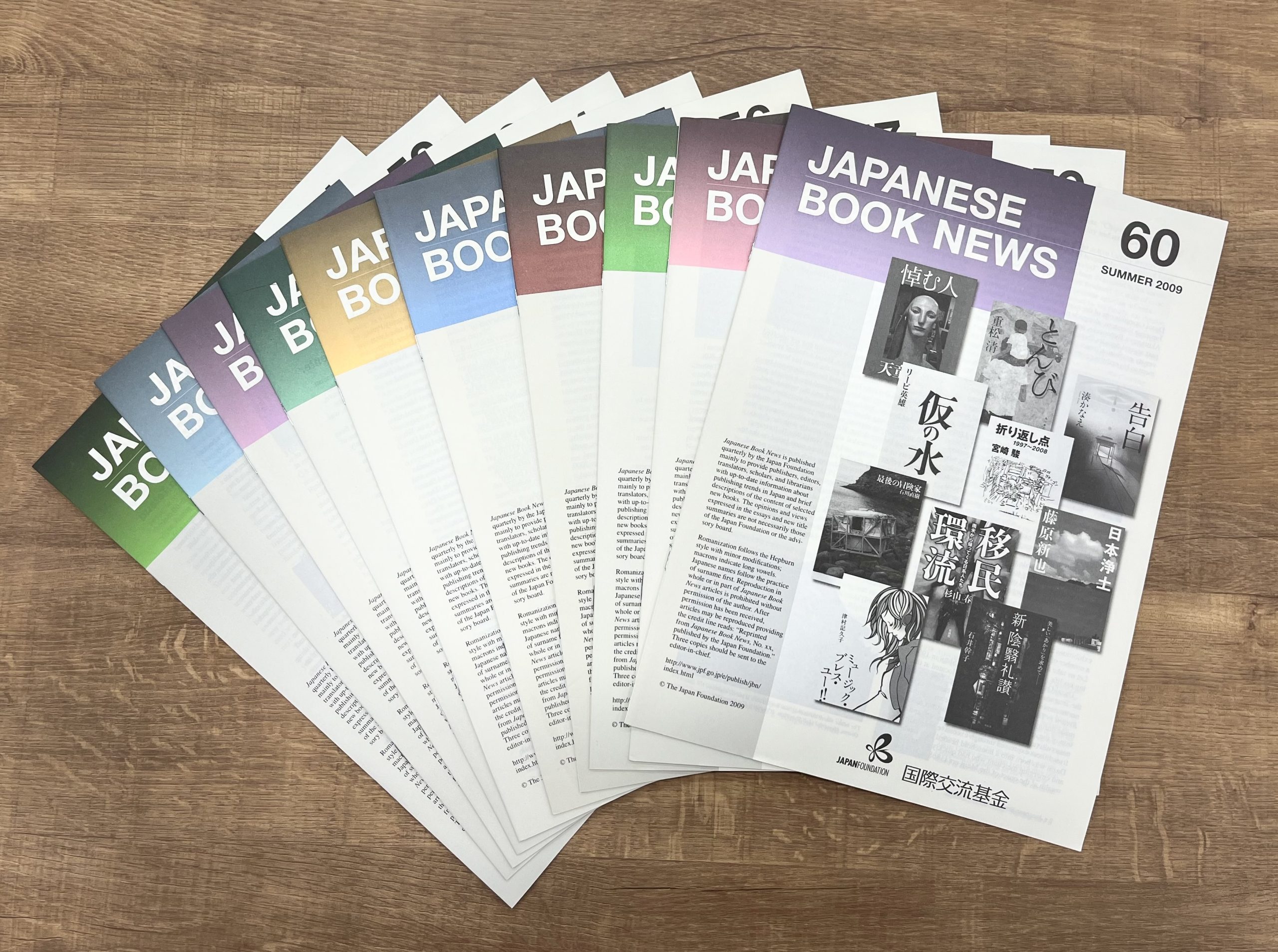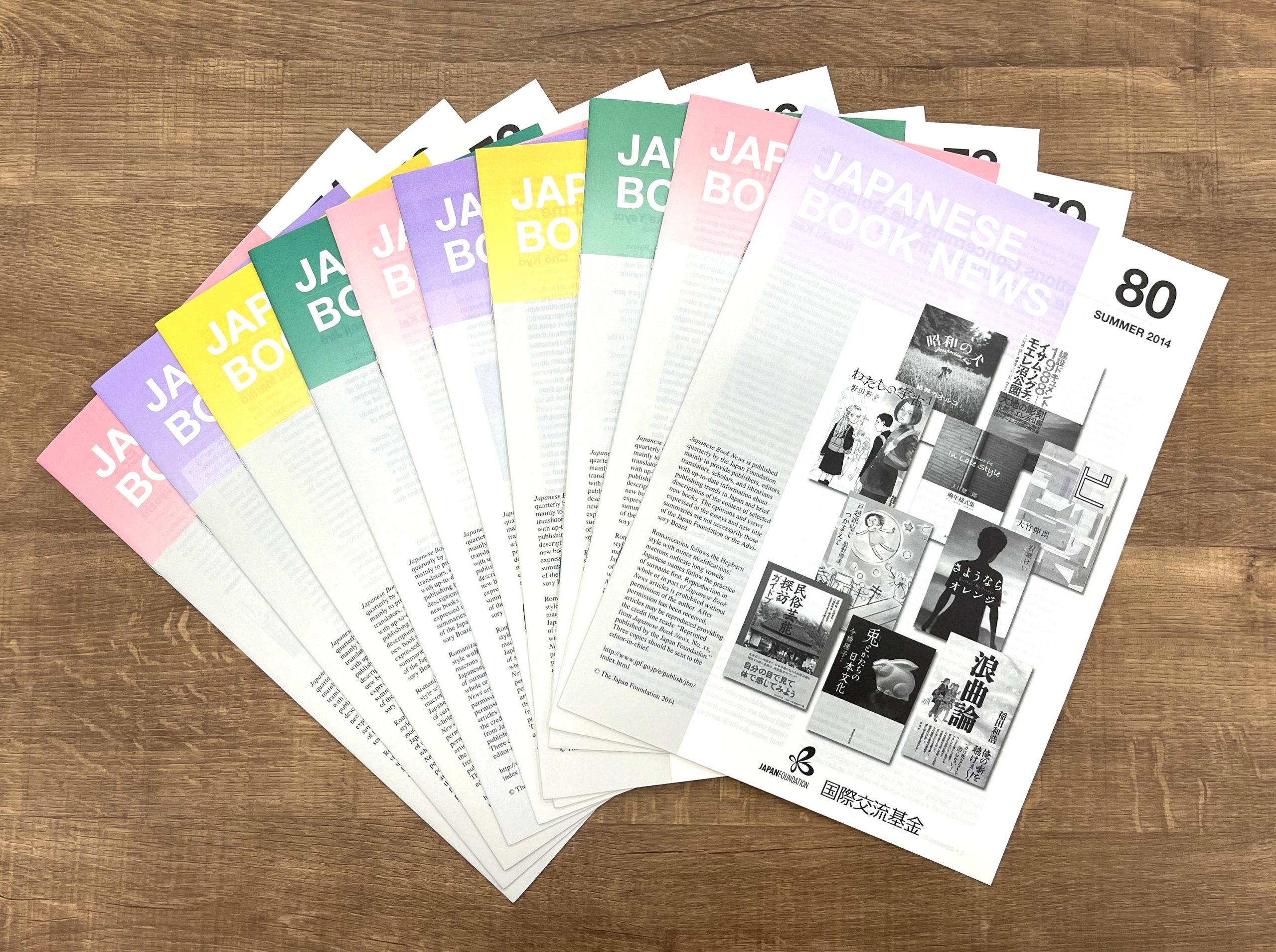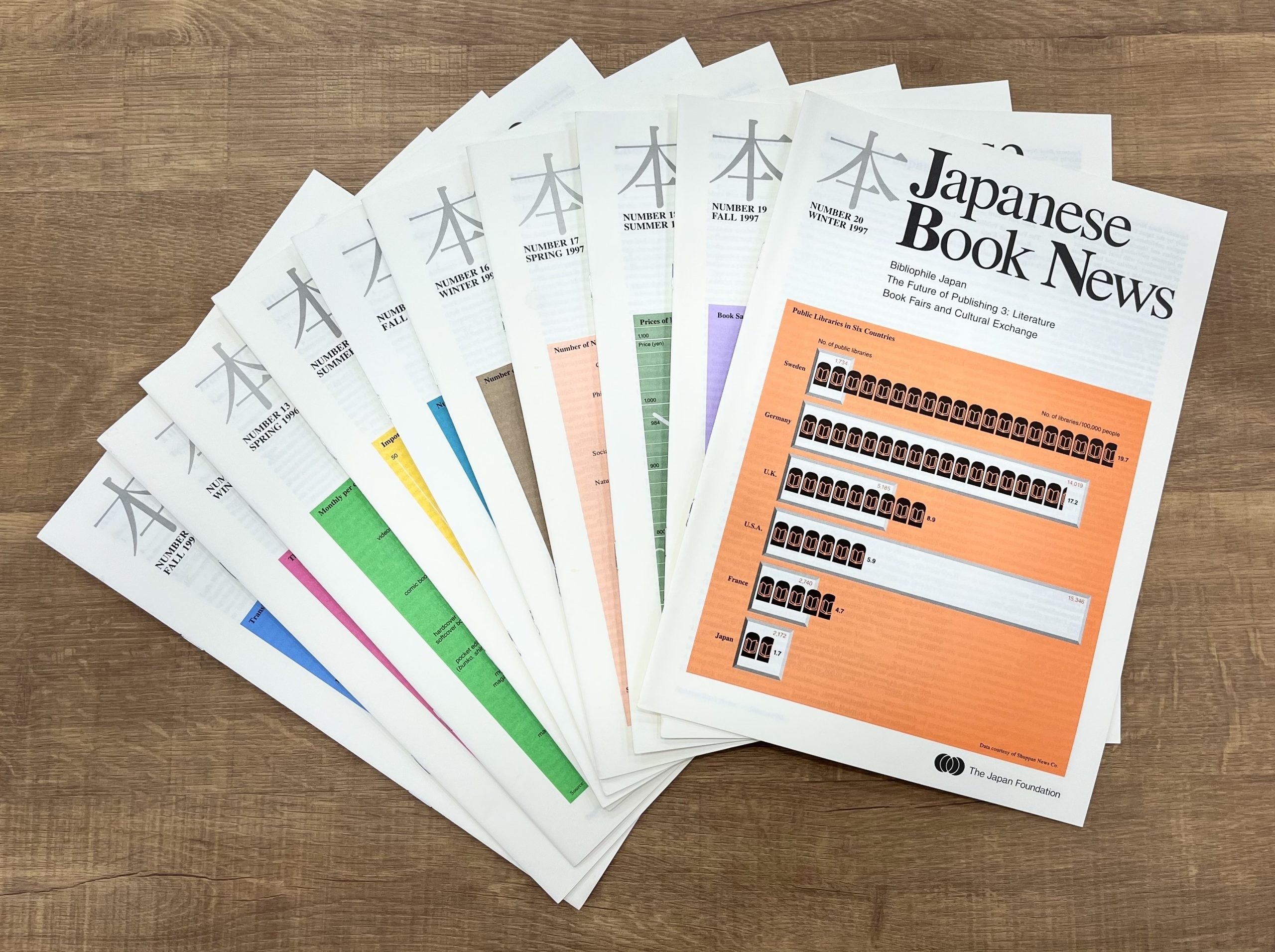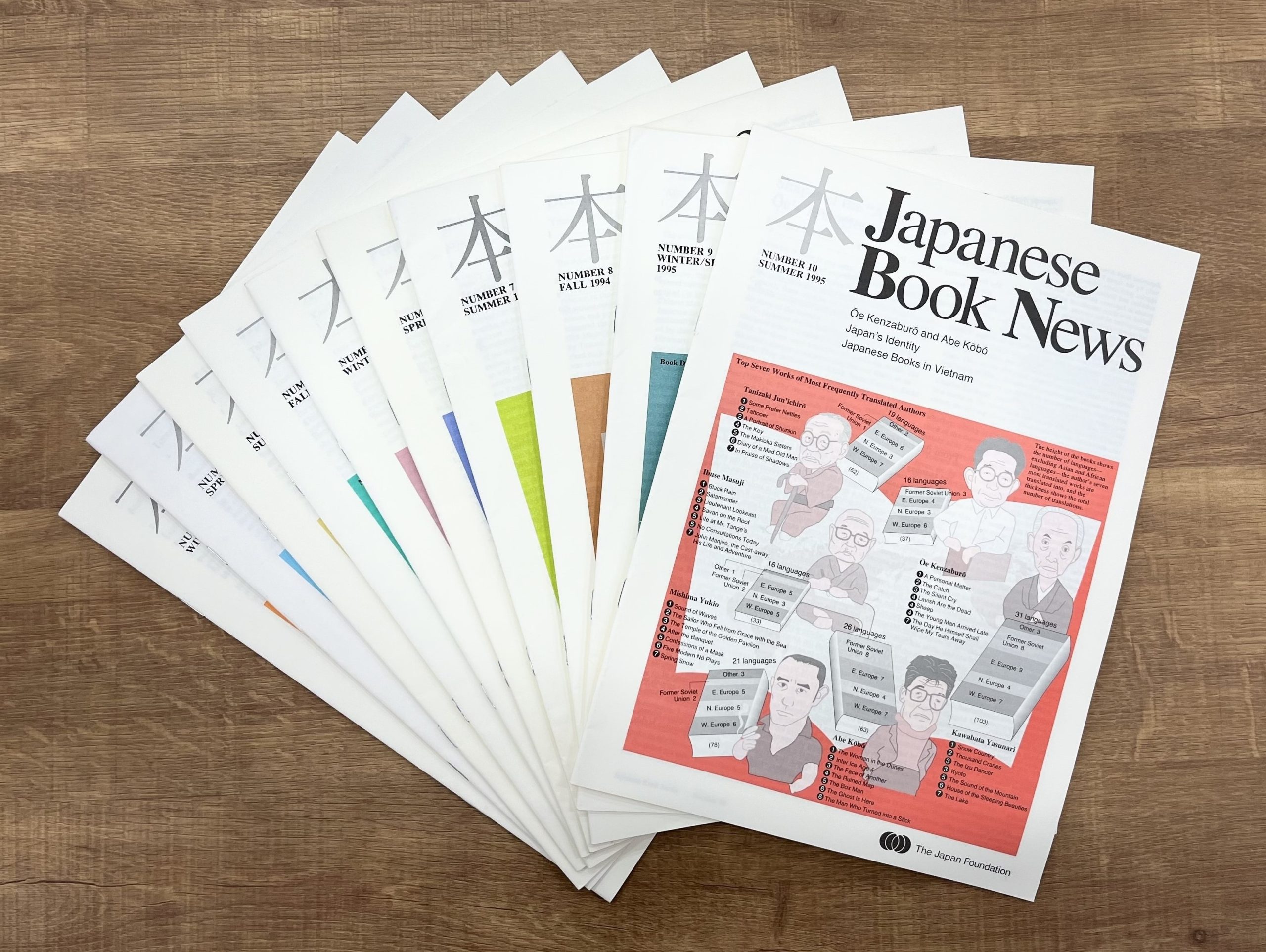No Longer a Foreign Country
At the end of February, I was taken to visit the Muslim-majority country of Indonesia. We traveled to the capital, Jakarta, and to the city of Makassar, which sits just south of the equator. This was right before the fasting period of Ramadan.
My book Temple Alley Summer had been translated into Indonesian, and a book-review contest had been held on Instagram for middle- and high-school readers; I was to attend the award ceremony. A total of two hundred entries had come in, and I had the opportunity to select the winners from among the finalists. All of the reviews were well done and fun to read, utilizing illustrations, photos, and video. It appeared that the entrants had also taken interest in Japanese culture and history. What made me happiest was how much they enjoyed the story. Ever since I debuted as a novelist, I have hoped that readers would finish my books and say, “Ah, that was fun!” So, I was all grins at this response. A couple of entrants said that they wished I had written a more detailed ending. I selfishly interpreted this to mean they wanted to keep on reading. At any rate, I felt hugely rewarded.
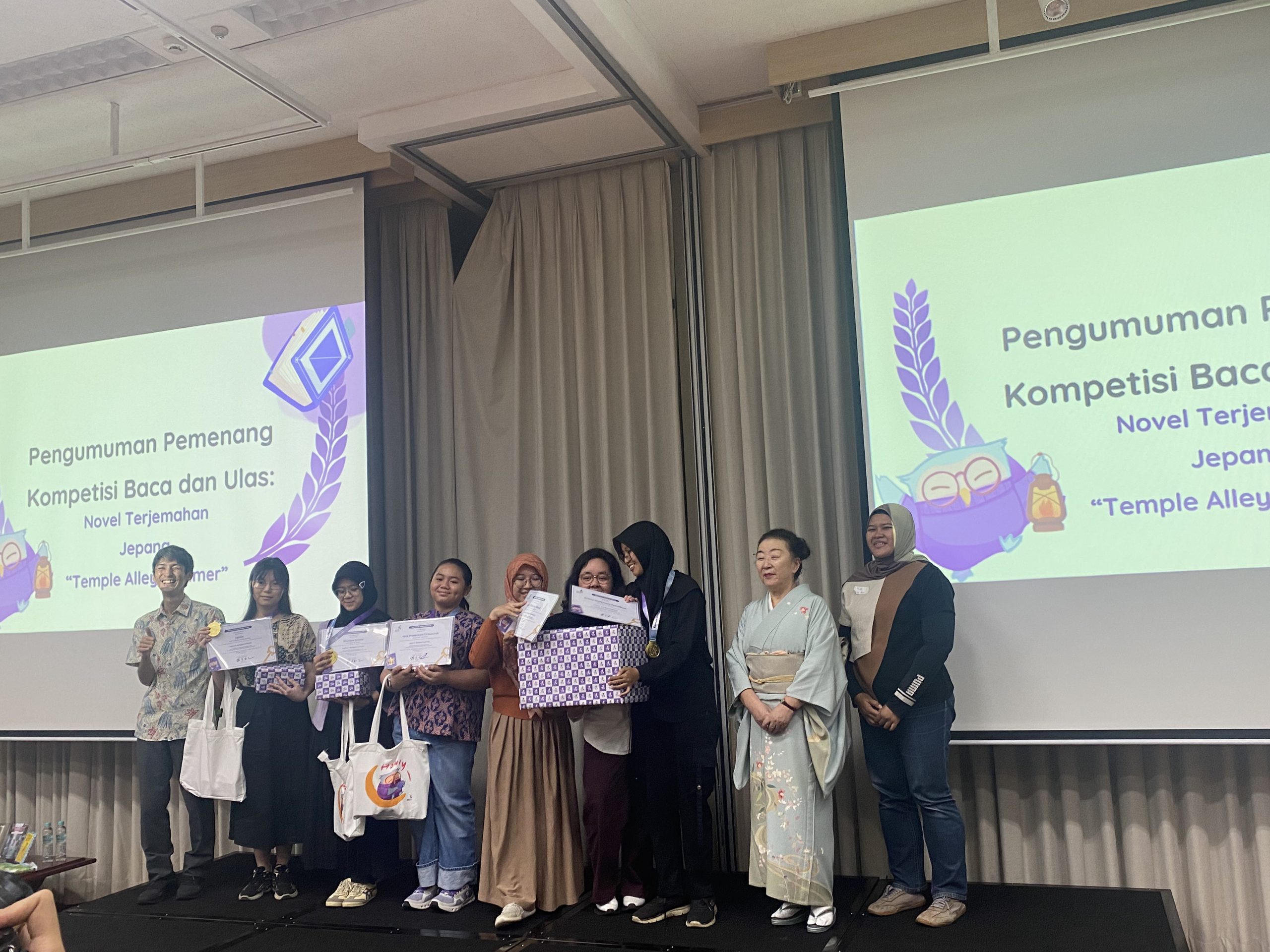
Book review award ceremony for the Indonesian edition of Temple Alley Summer
In Jakarta, a discussion was planned along with the award ceremony. Joining me was Rizal Iwan, a children’s author whose book I first received in Japanese translation prior to my departure. It was Book 1 in his Creepy Case Club series and had been specially translated for me by Miyake Shota of the Japan Foundation, Jakarta. I read it on the plane. It struck me as so well done that it could be published in Japanese exactly as it was. Thanks to that thoughtful translation, any misgivings I may have had about talking with an unfamiliar author disappeared. The book was a fantasy with spooky, mysterious aspects, but these had a heart to them that I connected with. I liked this fantasy. It kept me turning pages. And I was shocked to learn that women in their fifties in Indonesia can be called Granny!
Having flown in from Morioka, where it had been snowing, I arrived in a Jakarta that was hot and humid with colorful flowers blooming everywhere. Calls to prayer could be heard from mosques throughout the city, and women wore hijabs to cover their hair. I was told that it was the end of rainy season. On occasion black clouds would suddenly well up in the blue sky and disgorge rain in great bursts, making me feel that I had truly come to a foreign country.
The discussion and award ceremony took place at the Japan Foundation, Jakarta, where traditional dolls were on display for Hinamatsuri on March 3. Andry Setiawan, who had translated Temple Alley Summer, kindly served as interpreter and told me that he had gotten completely engrossed when he read the book. His enthusiasm surely infuses the Indonesian-language edition of the novel, making it inviting to many readers.
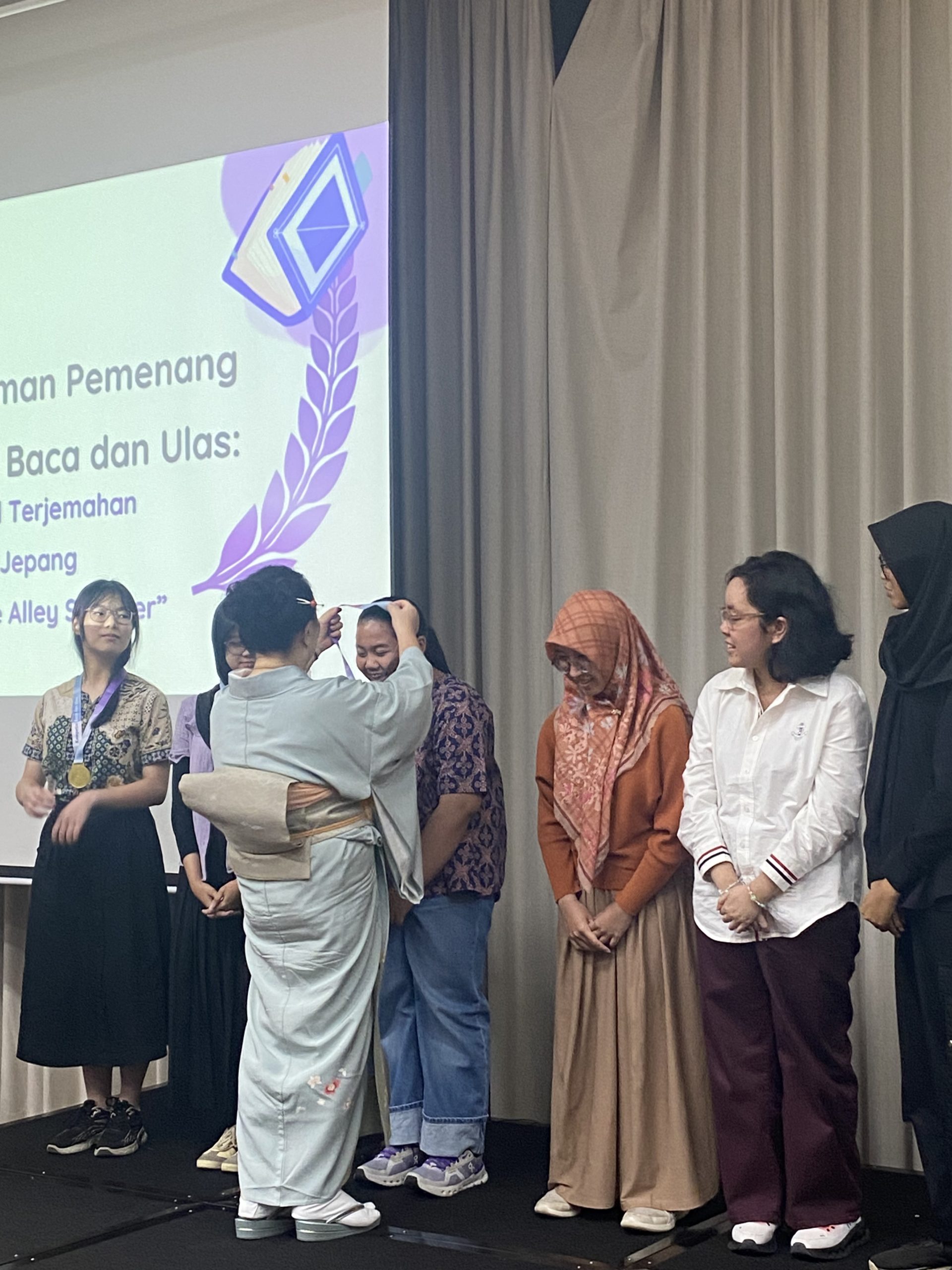
Book review award ceremony for the Indonesian edition of Temple Alley Summer
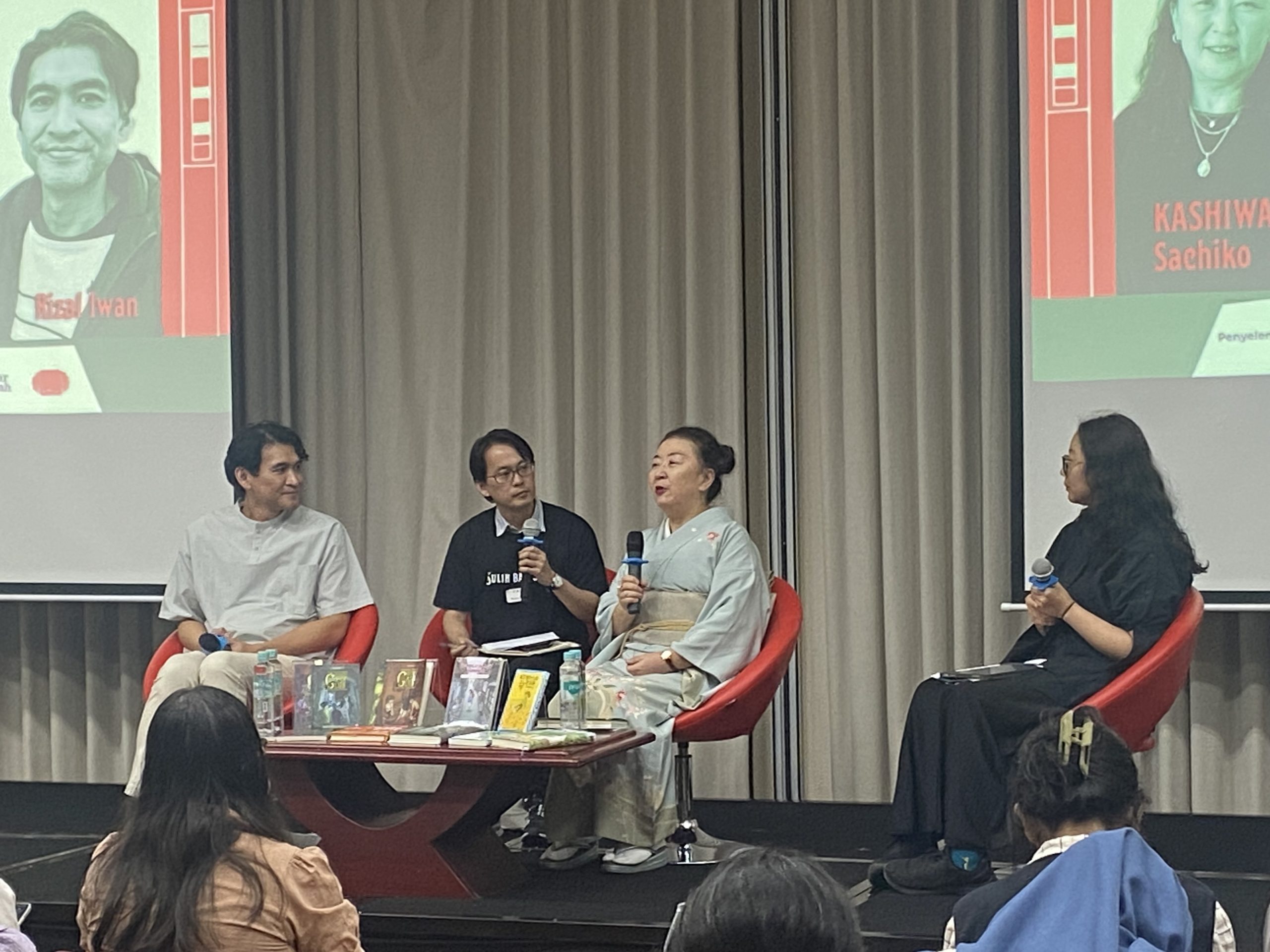
Discussion with Rizal Iwan
Iwan said in the discussion that his grandfather had told him spooky stories as a child. I believe it is adults who forge young children’s bonds with stories in this way. If children learn the joy of following a plot when they are small, they are sure to experience books as treasured friends.
The award ceremony was attended by schools in the greater Jakarta metropolitan area, and the students who took their place onstage seemed happy and proud. I believe they will continue to be avid readers.
Those who gathered brought their copies of Temple Alley Summer and requested, “Please sign!” Among them were attendees who had taken more than one plane in order to attend, coming from elsewhere in the Indonesian archipelago. I could only marvel.
A selection of snacks awaited in the greenroom. These had been boxed up like sweets in Japan, but I thought I glimpsed green chili peppers through the cellophane wrapping. Yes, those were chili peppers! The idea was to chew a small amount of green chili in each bite, together with a kind of deep-fried dumpling. These snacks were not, in fact, sweet; some of them even tasted like meat and potato stew. I found them fascinating and delicious.
In Makassar, I ate a dessert of banana wrapped in green mochi served on top of sweet, pink shaved ice. Why is the mochi green? I wondered. I bought jam of the same color as a souvenir and looked it up after I returned to Japan. I learned that the green color likely comes from the leaves of the pandan, often called the vanilla of Southeast Asia. It is used in sweets, surely including that mochi I ate in Makassar. Green and pink . . . banana, mochi, and ice! Such desserts were dazzling to the eye as well as tasty. I sometimes dream up mysterious foods for my stories, but this one far surpassed my imagination. Makassar is a port city, and the director general of the Japanese Consular Office kindly treated me to a fish dinner. I was astonished to be served fugu (blowfish)! I had only ever thought of it as a winter delicacy, but the fugu I ate south of the equator was scrumptious.
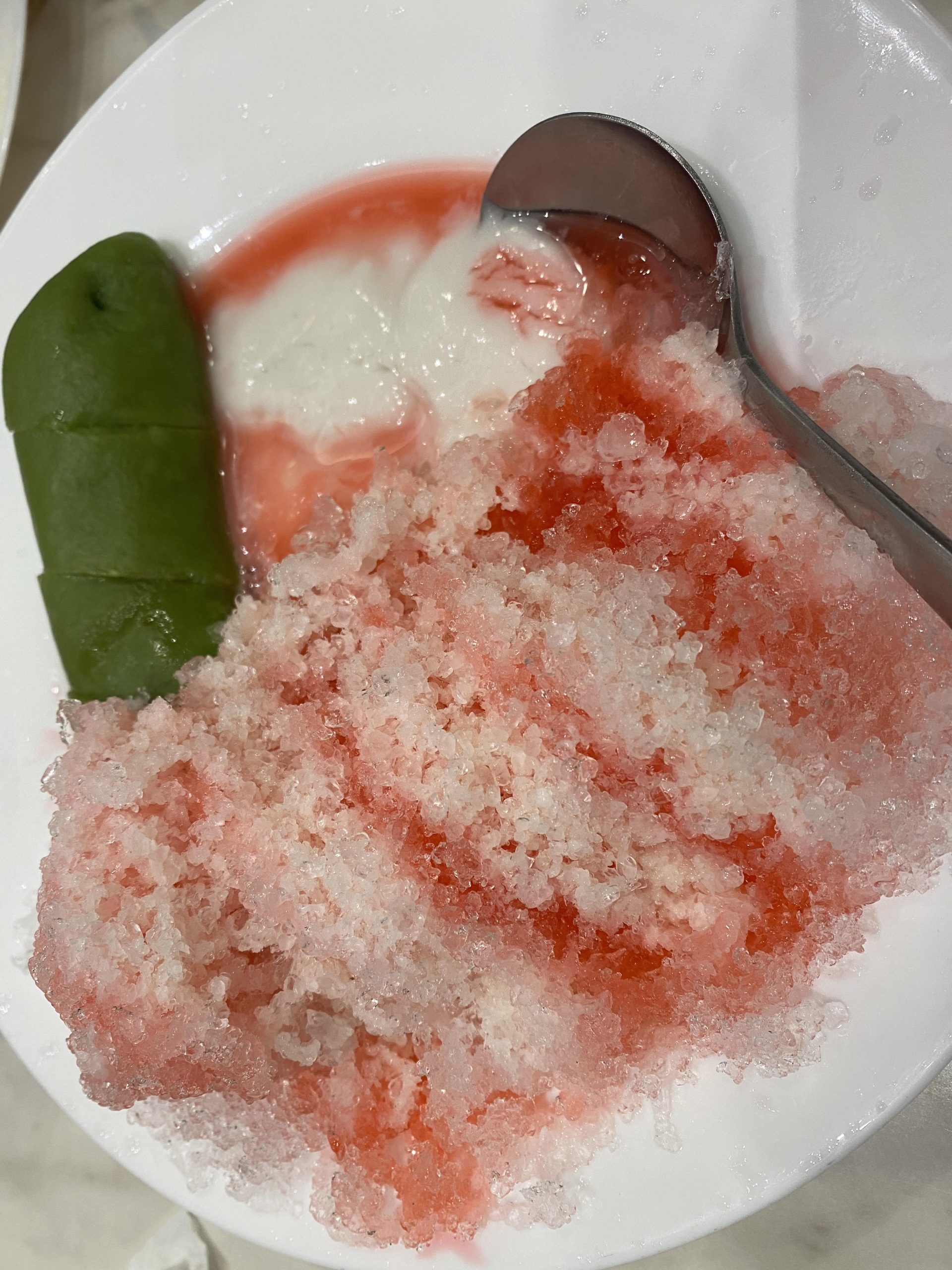
Es pisang ijo, a classic Makassar dessert
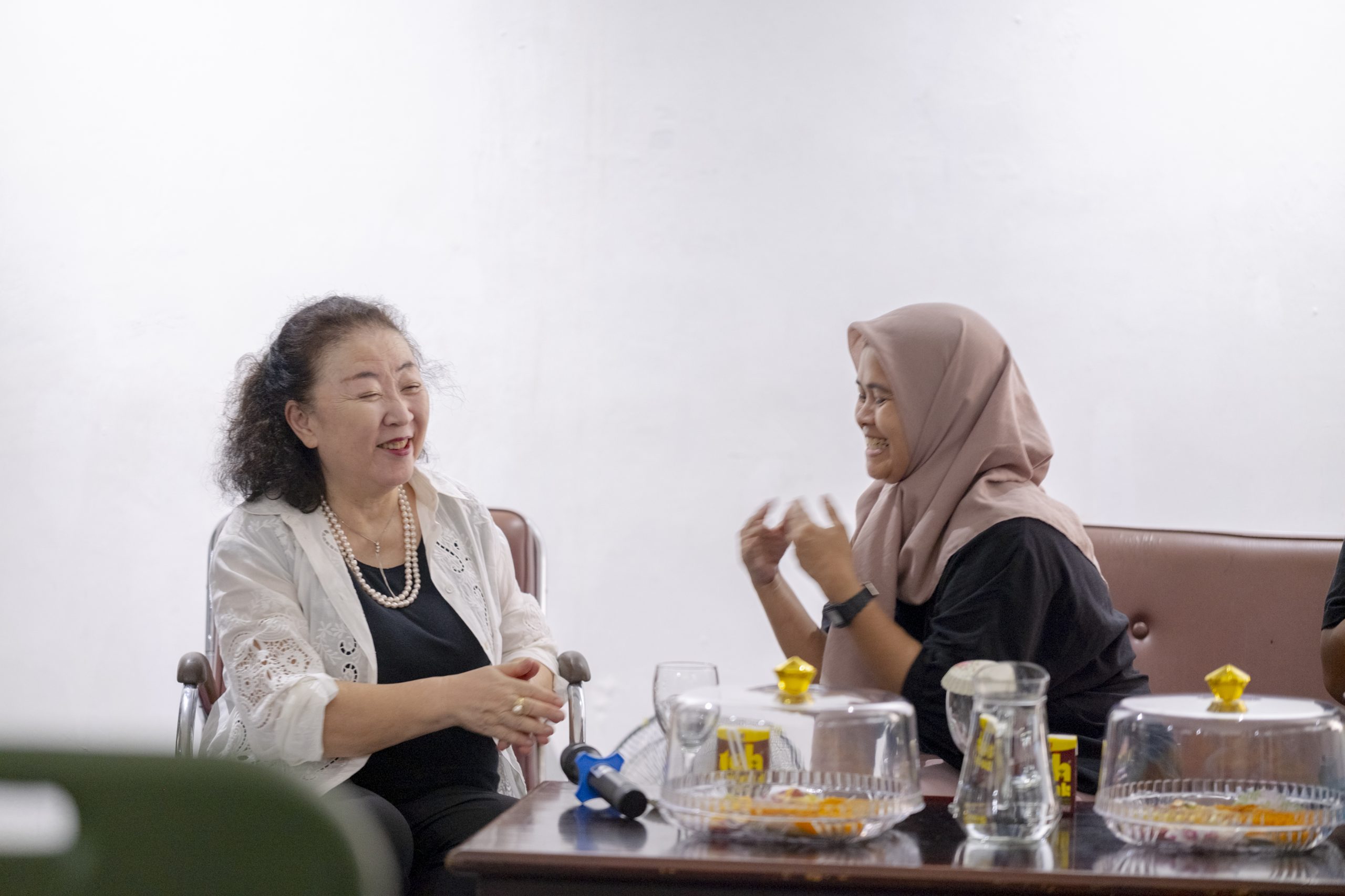
In conversation with Harnita Rahman
In Makassar, a book reviewer and mother of three named Harnita shared her impressions of Temple Alley Summer with me. She spoke rapidly for a good fifteen minutes, all but spitting in her eagerness to tell me how much she liked the book. What I found interesting was how she praised the main character Kazu for speaking boldly to adults as his equals. I had seen Kazu not as special but as a regular Japanese fifth-grader. Harnita explained to me that Indonesia maintains a strict patriarchal system, in which children must obey adults, so perhaps this is a difference in national character. She further told me that she had taken interest in Japan after reading Totto-chan: The Little Girl at the Window by Kuroyanagi Tetsuko. I barely managed to get in edgewise that I had written the text to a picture book about Kuroyanagi’s wartime childhood, called Totto-chan’s Fifteen Beans. I hope that more readers will read Temple Alley Summer and take interest in Japan.
At Hasanuddin University in Makassar, I did a talk event with author Faisal Oddang for an audience of Japanese literature majors. For this as well, I had received a helpful translation of Oddang’s writing in advance. I had found it quite dark and depressing, and I realized I was not alone when one student asked him, “Why did you write such a dark, painful story?” Laughter filled the hall, but the author replied, “I wanted you to share the character’s experience of hardship.” I used to wonder why the Ramadan fast existed, and I now know that one purpose is to experience the hunger of people who lack food. Oddang seemed to share this thinking, which I understood to be widespread in Indonesia. As it’s such a humid place, they say that after fasting for a day, a single glass of water is unbelievably delicious.
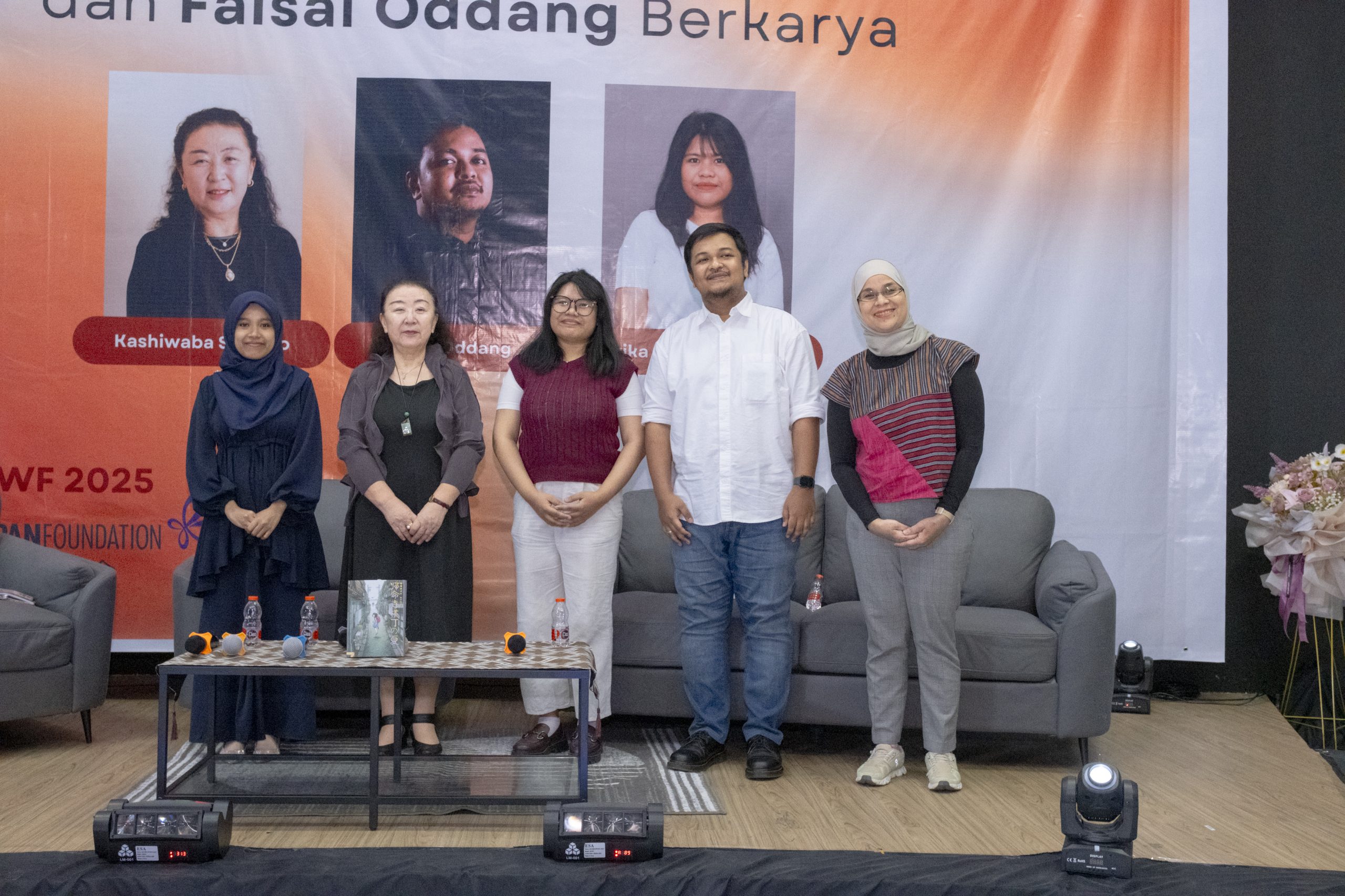
Discussion with Faisal Oddang
The students asked about the origins of my supernatural characters, and I mentioned the Tono monogatari folklore collection. The students seemed to take interest in it, so when I appeared on a university television show afterward, I received a request to talk about Tono monogatari. It was fun to talk about folktales from my home in a faraway country. The university students seemed to have taken interest in Japan through anime, manga, and video games, and now they were studying Japanese. A member of the university newspaper club mentioned taking interest in my novel The Village Beyond the Mist after seeing Spirited Away. This made me happy as well.
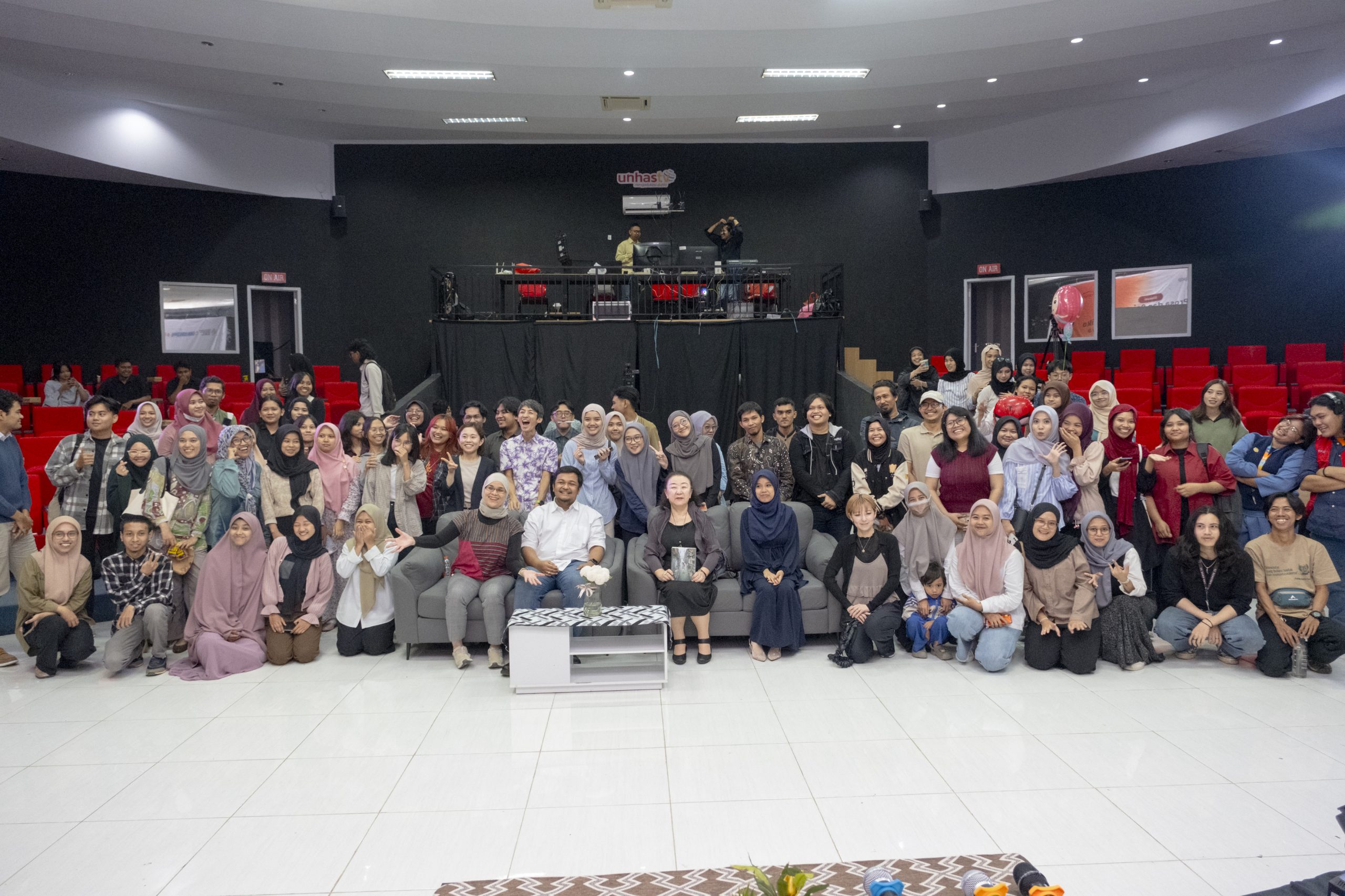
Kashiwaba and students from Hasanuddin University at the talk event
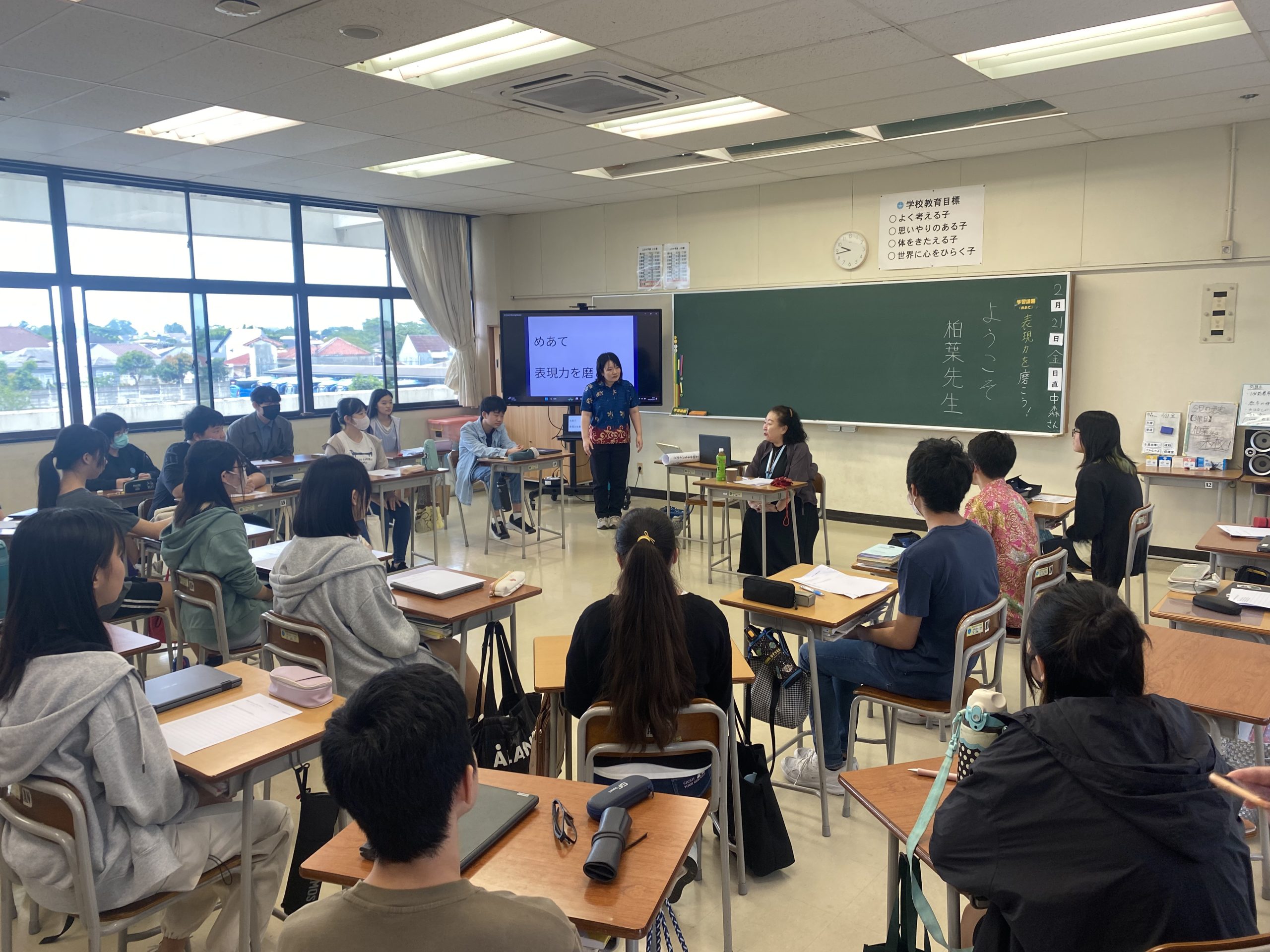
A special class at the Jakarta Japanese School
Back in Jakarta, I also visited the Jakarta Japanese School. There, I participated in a Japanese language arts class for students in the second year of middle school. This was actually the stop on my itinerary that had me the most nervous, because it was a class about how to write a story. The textbook excerpt that I had been given instructed students to first prepare a classic four-part outline—introduction, development, turn, and conclusion—and then build a story from there. This made me panic, because I have never made a proper plot outline—or perhaps I should say I can’t make one. If I think of a beginning, I just start right in writing! I guess I’m impatient. Could I really get away with telling the students that they didn’t have to follow their textbook? But, as it turned out, the class was not centered on me teaching, but rather on the students writing openings to stories. I was relieved and truly enjoyed reading their work. The students wrote with individuality and flair, and some of their texts really drew me in with only a few lines. The students themselves were full of life, and the class seemed to fly by. I got lost in a reverie, remembering my own school days. The editor who traveled with me said it was the same for her. It seems that neither of us was quite so lively as the students we met in Jakarta! But the school building and the echoes of students’ voices and footfalls took us down memory lane.
Japanese students who grow up hearing the daily calls to prayer are bound to become bridges between Japan and Indonesia. In the school library, I found many issues of their collected writings under the name Minami juji (Southern Cross). So very much writing! I could feel the connection between the two countries.
Later on, I read the stories completed by that same class of students. They told of anxiety about changing schools due to a parent’s job, and of the accompanying changes to one’s environment and friendships. Many of the pieces showed that students were looking at their surroundings with clear eyes. For someone like me, who grew up wholly inside Japan, their circumstances are a source of envy; at the same time, each of the students has worries and struggles. With the support of attentive adults around them, I trust that they will grow up strong. Some of them said that they would like to read my stories, so I garnered some new readers!
In Jakarta, I was taken to visit both a new, quirky bookstore and a large-scale one. The quirky shop seemed to enjoy close relationships with its customers. Seeing this reminded me of the neighborhood bookstores that I loved as a child, which have closed one after the next. I envied the shop’s customers. They had apparently been told that I was coming, and so they held a sort of book signing. Everyone kindly said that my book was interesting. One person said, “I haven’t read it yet, but it got good reviews on a book club website, so I decided to come!” Someone else said, “I came because I’m a fan of this shop.”
Thanks to the Japan Foundation, Jakarta, the days I spent in Indonesia were truly enjoyable, meaningful, and delicious. (If I wrote about all the food, this piece would never end!) Indonesia is home to readers who enjoyed Temple Alley Summer, so it no longer feels like a foreign country.

